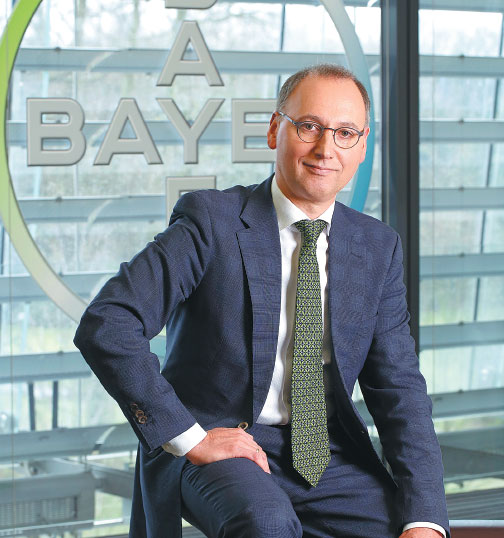A healthy approach to business
Bayer AG first came to China in 1882, and now the group's CEO will continue the company's investment in the core sectors of life sciences
Innovation appears to be embedded in Werner Baumann's DNA. It is part of his makeup and the driving force behind Bayer AG's philosophy in China.
As CEO of the sprawling German multinational life sciences company, the 55-year-old is committed to change. He also respects tradition.
|
Werner Baumann, CEO and chairman of the board of management at Bayer AG. Provided to China Daily |
"It is always nice to come to China and see how fast things are evolving and developing in the country, and in our group," Baumann says.
"We have been in China since 1882, and our future growth prospects are closely linked to the market."
Over the next five years, Bayer will continue to invest in pharmaceuticals, crop science and consumer health.
By 2020, the company will have injected 1.4 billion yuan ($207 million; 175.45 billion euros; £158.60 billion) into its manufacturing plant in Kunming, Yunnan province. Eventually, this will become a global hub for traditional Chinese medicine and Western-style pharmaceuticals.
"Our aim is to ensure access for healthcare products," Baumann says.
Bayer comprises about 301 consolidated companies in 78 countries, with its global headquarters in Leverkusen, Germany. The group has about 115,000 employees worldwide, according to its website.
Annual revenue in China was more than 5 billion euros ($5.85 billion; £4.48 billion) in 2016, while the company's global sales in the second quarter were about 12.2 billion euros, a jump of 1.9 percent compared with the same period last year.
"Pharmaceuticals posted sales growth of 4.4 percent to 4.3 billion euros," the group's website says.
Looking ahead, Baumann tells China Daily about his hands-on approach, the company's plans in China and his love for do-it-yourself, or DIY.
How do you visualize China's economic future?
The country has set 2020 as the target year to realize the "centenary goal" of building a moderately prosperous society (in an all-around way). This involves doubling its 2010 GDP and the 2010 per capita income of urban and rural residents by then.
In order to do this, China must maintain a steady medium-to-high rate of economic growth, while prioritizing better quality and more sustainable expansion.
With an increasing and aging population, it will be a challenge, both globally and in China, to ensure an adequate supply of safe, nutritious food and access to healthcare products.
How do you assess Bayer's prospects here?
We have invested in China for many years and have an extensive footprint here. The country is the world's second-largest economy, accounting for more than 30 percent of global economic growth in 2016.
We are confident we will be able to seize market opportunities in accordance with our business strategy and the needs of Chinese society. Our product portfolio and solutions are well suited to help generate sustainable growth.
What are your company's plans in China and for the group globally?
We believe that innovation and the ability to adapt quickly to a changing external environment are crucial drivers to invigorate and enhance economies. It will also help us stay competitive.
Our mission, "Bayer - science for a better life", puts innovation at the heart of our company. We innovate to meet our customers' and patients' needs, and to adapt to fast-changing circumstances. Therefore, China's push for more innovation fits our business and market positioning.
What is your business philosophy?
There are two things. First, always do what is right and be fully committed and confident when opportunities arise. Always manage risk responsibly.
The second point, in business and in life, is you must surround yourself with people you can trust. That is absolutely essential.
At Bayer, I am blessed and very grateful for the trust that I have been given, and for the fantastic people that I have the privilege to work with.
How do you plan to develop markets related to the Belt and Road Initiative?
The Belt and Road Initiative is exciting and bold. Since it was proposed in 2013, China has made progress in achieving its aim of building a trade and infrastructure network to connect Asia with Europe and Africa along various ancient trade routes. We believe that more connectivity and exchanges between countries will generally create opportunities for economic and social growth. Bayer has been engaged in China since 1882, and our future growth prospects are closely linked to the market here.
What is the secret behind your business success in China?
I would have to say deep knowledge of the market here and the ongoing commitment to the country, even through difficult times. You need the ability to anticipate trends and market developments, as well as key government initiatives.
You also have to roll out innovative product portfolios and customized solutions that meet the needs of Chinese consumers. A strong leadership team guarantees the strategy's implementation and helps achieve the company's goals.
We have qualified and passionate employees in China.
What is your biggest achievement in China as CEO of Bayer?
There are many areas in China which allow us to make a real contribution to the welfare of the Chinese people. One big trend is the shift in focus of the country's economy toward innovation and entrepreneurship. This suits Bayer as innovation is at the heart of our company.
We use advanced technology at our production sites in China. For example, the 100 million euro expansion of our pharmaceutical packaging plant in Beijing features industry-leading manufacturing efficiency, robotics, automation and digitalization.
Also, an oral multi-kinase inhibitor for the treatment of metastatic colorectal cancer and gastrointestinal tumors was launched in China this year. In the agribusiness, Bayer has rolled out nine new crop protection products in the country, covering rice, corn, wheat, vegetables and fruits between 2015 and 2016.
More recently, we introduced a traditional Chinese medicine product, which we produce at our plant in Kunming.
How do you get along with local partners?
We have long-term relationships with leading institutions and universities in China, including a strategic collaboration program with Peking University to promote translational research in drug discovery.
We also have a research program with the Shanghai Institute of Organic Chemistry of the Chinese Academy of Sciences in the fields of new synthetic methodology, natural product derivatives and organometallic chemistry.
There is, of course, a research agreement with the Shanghai Institutes for Biological Sciences to improve wheat yields. Other partnerships involve our e-commerce connections and startups through our digital health incubator program.
zhongnan@chinadaily.com.cn
Bio
Age: 55
Nationality: German
Career:
2016 onwards: CEO and chairman of the board of Management at Bayer AG 2014-16: Chief strategy and portfolio officer at Bayer AG
2010-14: Chief financial officer at Bayer AG
2002-10: Various leadership responsibilities after returning to Germany
1996-2002: Bayer Corporation in Tarrytown, New York, heading up the global Business Planning & Administration organization of the Diagnostics Business Group
1991-96: Bayer Hispania Commercial in Barcelona, Spain
1988: Bayer AG's Corporate Finance Department, Leverkusen
Education:
Studied economics at RWTH Aachen University and the University of Cologne, Germany
Family:
Married with four children
( China Daily European Weekly 08/11/2017 page31)



















